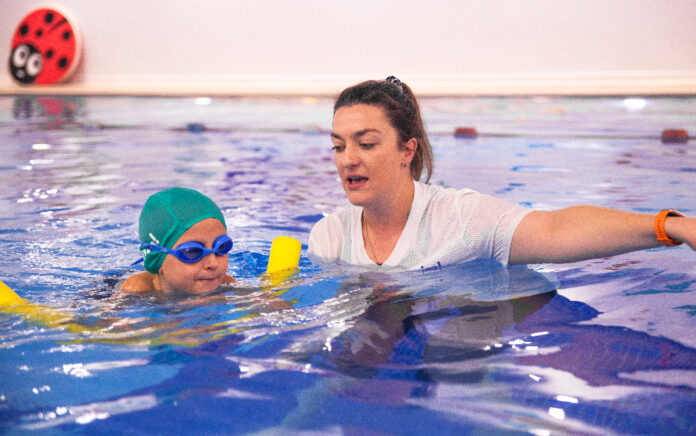GB Olympic medallists Becky Adlington and Steve Parry have warned of a crisis in swimming with hundreds of thousands of children missing out on lessons due to a shortage of teachers.
They spoke out as a national campaign was launched to help recruit the next generation of swim teachers, with Becky highlighting the importance of teaching youngsters a life skill and Steve describing the number of children leaving primary school unable to swim as “dire”.
There was a shortage of trained swimming teachers pre-Covid but the pandemic exacerbated the issue due to the closure of pools across the UK.
Schools without their own pool couldn’t provide lessons and swim schools couldn’t operate, with staff forced to leave and find alternative employment – many then opting not to return due to worries about the availability of work and reduced income.
The easing of lockdown restrictions led to a surge in demand for lessons that hasn’t been met due to the shortage of qualified teachers, which, in turn, has created long waiting lists.
With school swimming also in decline, a huge recruitment drive is needed to fill the teaching gap.
So Sporting House, the company founded by Steve which includes swim!, Total Swimming Academies, Beth Tweddle Gymnastics and Becky Adlington’s SwimStars, is investing almost £3m to address the issue.
“You have to describe the current situation as a crisis,” Becky says.
“There’s always been a shortage of swimming teachers but the problem has escalated because of Covid.
“Swimming, together with water safety, is such an important life-skill and sadly many, many children still drown each year.
“It genuinely helps save people’s lives, so you have to see it as a life skill rather than just a sport.
“If children can’t access lessons because there aren’t enough teachers, it’s a huge worry.”
Swim England, the national governing body in England, revealed earlier this year that a nationwide shortage of 8,000 swimming teachers could mean as many as 600,000 children missing out on lessons.
And one million children could leave primary school in the next five years unable to swim the minimum standard under the national curriculum, with warnings of a “lost generation” of swimmers unless action is taken to halt the decline.*
Prior to the pandemic, around one in four children could not swim the statutory 25 metres when they left primary school and it is feared that could rise to three in five children by the 2025-26 academic year.*
“It’s dire,” Steve says.
“I fundamentally believe all children should be able to swim.
“So does our education system, given it’s a statutory requirement at Key Stage 2, but we are failing to achieve it, drastically.”
“We want to be part of the solution by providing more swimming spaces, recruiting more good quality teachers and offering more lessons.”
The recruitment campaign is also backed by World Champion gymnast and fellow Olympic medallist Beth Tweddle, with a shortage of coaches also a problem in her sport.
“There’s always been a huge demand for gymnastics,” she says.
“But Covid had a huge impact and the absence of courses led to a backlog of people who were ready to take exams but couldn’t.
“Many teachers were forced to find other work because they wanted job security and it was uncertain when sports were going to reopen.
“Now we’re trying to fix that backlog by bringing in new people and offering them training.”
Beth believes gymnastics is a fundamental skill that equips children with skills they can use across other sports.
Along with swimming, it also instills other qualities such as confidence, leadership and a ‘can-do’ attitude.
As Steve emphasises: “It’s not necessarily just about movement, balance or agility on the gymnastics side or even learning a life skill through swimming.
“For me, it’s about gaining confidence from doing those activities. That doesn’t just help children in sporting endeavours, it helps them in life.
“I love nothing more than watching a swimming or gymnastics lesson and seeing the currency we deal in, which is smiles.
“That’s really what Sporting House is about and we’re lucky to have over 30,000 children engaged on our programme each week, but we can have a lot more if we find more teachers – the demand is huge.
Just as important is the focus on encouraging activity, with falling participation rates for children in sports and the UK’s child obesity crisis.
“Obesity is a big issue in primary schools and we have to be careful not to let our kids get into bad habits and become overweight from an early age,” Steve says.
“It also creates issues later in life.
“It’s not hard to resolve, but society is pointing children to more sedentary lifestyles with video games and so on.
“So parents need to ensure their children stay active.”
Sporting House hopes to recruit 100 swimming teachers and 40 gymnastics coaches by the end of the year.
Longer term, they want to add 4,000 by 2030.
They will pay the £1,000 training costs for each teacher/ coach and stress that would-be applicants don’t need any previous experience or qualifications.
Steve says: “We fundamentally believe we should hire people on attitude and then train for skill.
“It’s all about the relationship between the teacher and the youngster – sports teachers can be highly influential to a kid’s life.
“If you’re passionate about making a difference, and believe kids should have good opportunities and enjoy experiences, this is a role for you.”
He emphasises how teachers will earn an average £20,000 per year, making the roles more attractive than low-paid entry-level jobs in other sectors, and there will be career pathways for them to follow.
“We are making huge investments to pay people good salaries and deliver quality lessons,” he adds.
“I hope it makes the rest of the industry think about it too.”
Becky, who recalls her own experience with her first teacher as she began her journey to swimming stardom, says applicants can come from all walks of life.
She says: “I was really lucky when I was growing up in Mansfield because I had an amazing teacher called Linda.
“I loved my swimming lessons and still remember being in the pool aged five because she was so brilliant.
“If you have a good teacher, you’re much more likely to carry on because you develop a bug for it.
“We’re looking for teachers with passion and the right personality. It’s not about knowing the right technique or elite stuff about your hands being at the right angle with your elbow.
“Confidence is important too. Sometimes you might need to sing or do other silly stuff with kids – so you shouldn’t be easily embarrassed!”
One of her swim teachers came from an accounting background, she adds, while a mum who came along with her child to lessons was so enthused she also undertook training to become qualified.







